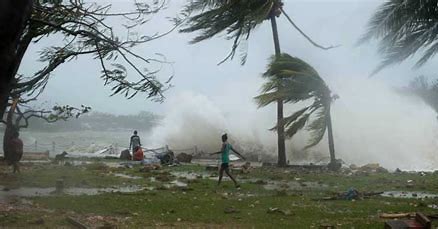UNICEF said in a statement that Cyclone Freddy made landfall with sustained winds of nearly 150 kilometres per hour (93 miles per hour), causing "severe damage and cutting off children and families from critical services".
Winds and Rain Lash Mozambique as Cyclone Freddy Makes Landfall


Mozambique is being battered by heavy rains, destructive winds, and flooding as Cyclone Freddy on Saturday made its second landfall in a month in the southern African country.
Freddy, which has caused Mozambique to receive more than a year’s worth of rainfall in the past four weeks, may become the longest-lasting storm on record, having formed to the northwest of Australia 34 days ago.
The storm has destroyed houses and affected nearly 2 million people. One person has been reported dead, bringing the death toll to at least 28 since the storm first made landfall last month.
Freddy on Saturday made landfall for the second time near the eastern seaport of Quelimane at around 22:00 (20:00 GMT).
According to the United Nations Office for the Coordination of Humanitarian Affairs (UNOCHA), more than half a million people in the country could be at risk of a humanitarian crisis this time around. People have been urged to move into temporary shelters – including schools, churches, and warehouses.
Electricity has been turned off as a precaution by the power utility firm and all flights have been suspended, according to state channel TVM.
Freddy is reported to have stalled offshore and is thought to be making its way onto land soon.
“I can see some houses with roofs torn apart, broken windows, and the streets flooded. It’s really scary,” charity worker Vania Massingue, from the port city of Quelimane in Zambezia province, told Reuters.
Experts say climate change is making tropical storms around the world wetter, windier, and more intense.
Freddy had already broken records for the strength it has accumulated over the 8,000-km (5,000-mile) path it travelled across the Indian Ocean for north-western Australia.
Mozambique’s national disaster management agency estimates that more than 1.5 million people have been affected since the cyclone first hit the country in February, with more than 8,000 forced out of their homes.
A humanitarian operation is ongoing in the region, but there are fears that aid efforts may be hampered by new heavy rains from Freddy’s return.
Neighbouring Malawi, where health authorities are battling a cholera outbreak, is also set to be affected by the cyclone.

 বাংলা
বাংলা  Spanish
Spanish  Arabic
Arabic  French
French  Chinese
Chinese 
